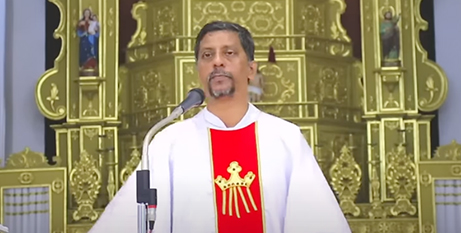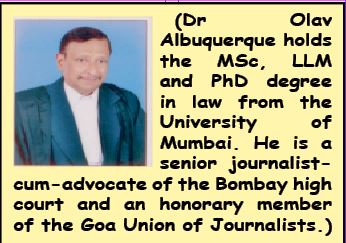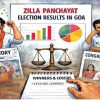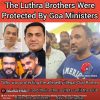Goa is abuzz with excitement as vintage bike and car owners, users, collectors and fans are decking […]

TO SAVE A BELEAGUERED PRIEST!By Dr Olav Albuquerque
Apr 27- May 03 2024, LAW April 26, 2024By Dr Olav Albuquerque
FREEDOM of speech is a chimerical concept, which sounds fantastic in theory but may exist in a moth-eaten form in practice. A Catholic priest who holds a PhD degree in botany and taught at St Joseph’s College in Cortalim, learnt this when he commented on a national hero, who is revered as a religious icon. This priest was booked by the Vasco police under very stringent sections of the Indian Penal Code, 1860 for creating disharmony between groups under section 295-A apart from other sections of the same law.
However, the learned judges of the high court dissected the entire issue and quashed the FIR and criminal proceedings against the Catholic priest to set him free. The judges said there was no deliberate intention on the part of this priest to outrage the religious feelings of any class of citizens.
ERUDITE JUDGMENT
THE priest, Fr (Dr) Bolmax Pereira would have been in jail were it not for an erudite judgment of the High Court of Bombay at Goa which dissected the entire issue and quashed the FIR and charge-sheet against the distraught priest. He approached the high court pleading that as part of his duties as the parish priest of St Francis Xavier Church at Chicalim, Goa, he presided over mass and delivered sermons. The erudite division bench comprising Justices Mahesh Sonak and Valmiki Menezes saw through the incident and quashed the criminal proceedings against the distraught priest.
Fr (Dr) Bolmax Pereira said during the Covid-19 pandemic, his mass and sermons were regularly broadcast over the You Tube channel titled “SFX Chicalim” for the benefit of parishioners and subscribers of the channel.
On August 3, 2023 Fr Bolmax told the high court he was made aware that a short clip of his recorded broadcast were broadcast on social media alleging that his sermon had maligned a revered icon. This prompted him to issue a clarification that his words were being circulated out-of-context and he never intended to hurt the religious feelings of any group. He immediately issued a clarification and apology which was broadcast on various media platforms.
Nevertheless, a group of people visited the Vasco police station and met the police inspector, after which an FIR 52/2023 was registered by the Vasco police station alleging the priest had committed a crime under the stringent section 295-A which deals with creating disharmony between groups of Indian citizens. The priest had to immediately apply for anticipatory bail which was granted to him by the Sessions Court.
The advocate for the priest told the high court that a plain reading of the FIR disclosed that no offence had been committed by the priest, there was nothing in the sermon on which the complaint was based to remotely suggest the priest was involved in any deliberate and malicious act intended to outrage the religious feelings of any class of citizens by insulting their religious beliefs.
The advocate for the priest argued there was nothing in his sermon to allege that his statements were such as to intend to create a breach of the peace and public nuisance. He argued the priest’s statements were protected under Article 19 (1) (a) of the Constitution and pointed out several earlier judgments of the high court to argue that the FIR and criminal proceedings should be quashed.
SHIVAJI, REVERED KING
HOWEVER, appearing for the state of Goa, the additional public prosecutor, Pravin Faldessai, argued that the ingredients of the sections had been fulfilled and there was no infirmity in the registration of the impugned FIR. He argued that the veracity of the allegations could not be tested at the stage of arguments after the filing of the Criminal Writ Petition to quash the FIR and criminal proceedings.
Kiran Naik appeared in person and placed on record that the revered king was an inspiration for him and his followers serving as a beacon for them. He also placed on record his pooja room with photographs of the idol of the religious icon and national hero to argue that the Catholic priest who had said that the warrior and revered religious icon was not a god but only a national hero, had insulted their religious feelings which was why the petition he had filed ought to be dismissed.
The erudite and learned judges then reproduced the sermon delivered by Fr Bolmax Pereira in its entirety to evaluate whether there was any intention to outrage the religious feelings or hurt the religious sentiments of a class of people. They also evaluated whether the ingredients of section 295-A had been flouted.
The judges examined the Supreme Court decisions on the aspect to infer that only those utterances calculated to deliberately outrage the religious feelings of a class of citizens was punishable and not otherwise. The judges opined that the entire sermon was to be read as a whole and not certain isolated passages taken out-of-context. The judges observed that the Catholic priest may have disagreed with the view that the national hero who was a warrior king was god, but he immediately followed it up by apologizing and stating unequivocally that the national hero deserved honor and respect.
NOT MALICIOUS
THE judges observed there was nothing to observe that there was any malicious or deliberate attempt to outrage the religious feelings of any class of citizens. They observed that in Justice Markandey Katju versus Lok Sabha, the Supreme Court had pronounced that the right to freedom of speech and expression protected unpopular and dissenting opinions, because those which are popular and extol the virtues of any politician or other figure need not be protected.
The judges quashed the FIR and criminal proceedings against the priest by citing an apocryphal tale of the great warrior king who was hit on the head, when a stone thrown by an old woman to knock a mango from a tree, accidentally hit him on the head. The king freed the woman and ordered she be given money. He reasoned that if a tree could tolerate a stone thrown at it, how much more should a great king be towards his subject who was hungry and wanted to eat a mango.
















